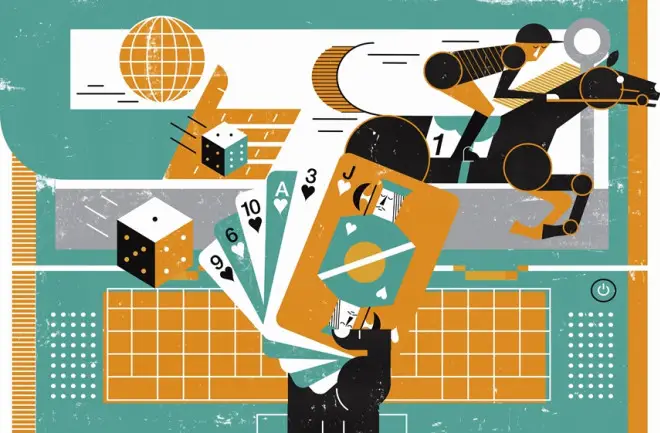Superstition A Driving Force Among Male Gamblers, Study Finds

People gamble for many different reasons. But generally, when the odds of a wager are clearly in a person’s favor, they are more likely to make a bet. Surprisingly, studies have found that men are more likely to engage in gambling rituals and other types of superstitious behavior.
Superstition here includes everything from a fortune-teller sharing their predictions to placing bets on birthdays, and other similar beliefs. Once there is a perceived supernatural advantage on the bet, a man is likely to gamble, believing that the odds are in his favor.
One of the most profound primary research attempts on this theory was published in September 2024. The paper was published by Xiaoyue Tan, Jan-Willem van Prooijen, and Paul A. M. van Lange and it has been getting a lot of attention since it was released to the public. Here are some of the key conclusions derived from the research study.
A prediction of good fortune makes people more likely to bet

In the study, members of a sample demographic were given good fortune predictions and neutral fortune predictions. The results showed that people who received good fortune predictions were more likely to wager than those that got neutral predictions.
Based on the results, the researchers were able to conclude that the participants were willing to take on the financial risk, trusting the positive prediction that they had received.
It also affected non-superstitious people
Even participants who did not believe in superstitious practices or the supernatural were influenced by good fortune predictions. They did not have to consciously recognize the prediction and decide to make a wager based on it. Instead, it had a subtle, subconscious effect on their decision-making process, and they acted on it.
The good fortune prediction affected the men’s decision to gamble, but not the women’s
Interestingly, all these effects were mostly found in men. Among the women, there was little to no difference in the results of those who received good fortune and those who received neutral fortune predictions.
The authors suggest that the indifference of women to good fortune predictions and making bets come from them naturally being averse to financial risk. Men, on the other hand, seem to be more interested in engaging in such practices. Thus, once there is a hint of luck being on a man’s side, whether it is suggested subtly or directed, he is more likely to try it. This is also a reason why men tend to believe in different gamblers’ fallacies and engage in other financially risky practices.
This is not the first time that studies will give these types of results. Based on another research study, some conclusions were reached on why men are more likely to take on financial risk than women. A conclusion here was that women are more affected by communion goals related to losing minimization. Men, on the other hand, are more driven to take on financial risk by self-oriented goals related to gain maximization.
I don’t think there is any evidence for this idea. There is plenty of evidence that superstitions can affect gambling behavior, but none that suggests that superstitions cause people to gamble more. In fact, the opposite seems true. For example, one study found that people who believed in astrology were less likely to gamble. Another study found that people who thought about the future were more likely to gamble. And yet another study found that people who made decisions with an eye toward the future were less likely to gamble than those who didn’t.
Gamblers are born with an innate tendency to believe in luck. It is also said that the more you gamble, the higher chance of winning becomes. They say that gambler’s fallacy is based on this notion. They are superstitious for two reasons. First, they think that whatever happens must be due to luck or chance. Second, they feel lucky when they win money from gambling. So they believe their good fortune is connected with their wins at the casinos.

It is said that gamblers are born with an inherent tendency to believe in luck because they are born with a belief system that says that everything has a purpose. The universe is designed to work in certain ways. If something doesn’t go according to plan, then it means that something went wrong. It is said that if we do not understand how things work, then we cannot predict what will happen next. We have to accept that things just happen without our control.
When someone loses money, they may blame themselves for having lost. But when they win, they may attribute their success to luck rather than skill. When someone wins, they may become overconfident and start believing that they will always win. In addition, they may believe that they will get even bigger wins in the future. That is called “chasing losses.” People who chase losses are often very disappointed when they lose again. They may also believe that they will never lose again. That is called ‘losing the fear of loss. In general, people who believe in luck are more likely to gamble. However, they are also more likely to make bad decisions.
Superstitions help people cope with uncertainty. By telling themselves they will always win or lose, gamblers make sense out of random events in their lives. When something bad happens, they believe that if they were not lucky enough to escape unscathed, then someone else must be punished. The same goes for good fortune; when things go well, gamblers think it means others have suffered misfortune. The problem with these beliefs is that they are false. Superstitions are irrational beliefs that lead people to behave irrationally. People who believe in luck are usually poor decision makers. They tend to spend all their money quickly and borrow more money to pay off debts. They also tend to waste time and energy trying to figure out why they keep losing.
Final Thoughts

Evidently, in the present society, men tend to take on financial risks more than women do. No one would have thought that superstition would be a factor causing this, but this study has been able to prove it. So, without even knowing, a random superstitious suggestion could make a person feel lucky enough to make a paid bet.
However, it should be noted that the study was carried out with fictional money, so the results might not accurately describe reality. Irrespective of this, the theory is still valid to a reasonable extent.
If you’re interested in placing some bets to see whether your behavior is affected by superstition, head over to Bonus.net.nz for exclusive offers, in-depth reviews, and more

